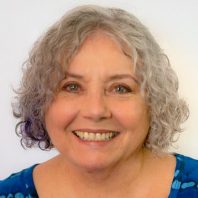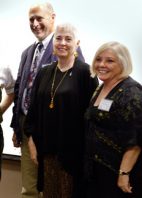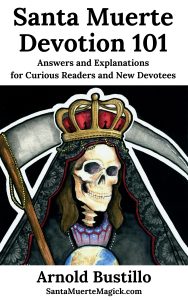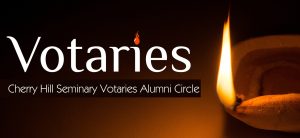As Cherry Hill Seminary’s first permanent Academic Dean, Wendy brought a dedication to academic integrity and a devotion to Pagan and Nature Spirituality. By the time she retired in 2018, Griffin had inspired students and colleagues alike with her intellect, skills and engagement. Only recently, the seminary Votaries alumni group created the Wendy Griffin Professor of the Year award in her honor. Read our announcement of her passing here.
Wendy wrote this about herself as author of The Fifth Sun when it was published: I was a college dropout. At the end of my first semester at Northwestern University, back in the days when female students were locked in the dorm at 9 p.m., I made a rope ladder out of sheets and escaped out the window. I fled to New York to do Off Broadway, ending up working with Dustin Hoffman, among others. In between shows, I supported myself as a puppeteer, a “Beat” poet, and a diamond courier. After several seasons, I went with friends to Mexico and from there to Florence, Italy. But the wet Italian winters depressed me, so I strapped my guitar on the back of a motor scooter, and headed across the Alps to southern Spain. During the next decade, I married a Spanish pop musician, had a daughter, worked as a folk singer in London, and traveled across Europe with the band. Ten years later, I returned to the United States to find myself a single parent with a high school education and very limited labor market skills. I worked as a Spanish/English interpreter in Chicago and then branched out into folk and cabaret singing before moving to California. Here I sang in several clubs and got full-time work as a cocktail waitress and bartender while I went back to college. Fortunately, going back to school gave me access to a great library, and I learned to love doing historical research. Finally I got enough scholarships to quit my job and go to school full time at the University of California at Irvine, first getting my BA, Magna Cum Laude, and then my Ph.D. in the interdisciplinary Social Sciences, with an emphasis on the sociology of sex and gender. I spent about 36 years as an academic. When I retired, I was able to return to my first love – writing novels. My academic career gave me the training to be as historically accurate as possible, a fact that I believe enriches my writing and helps bring the stories alive.
Many friends and colleagues have shared their memories of Wendy.
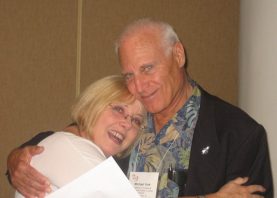
Over the following years, Wendy and I became the co-chairs of the Contemporary Pagan Studies Unit for the American Academy of Religion. Working together with her, as was also the case when she became the Director of Cherry Hill Seminary, has always been a delight. But more than simply a co-academic, Wendy has also become a dear, dear and much-loved friend. For all her intelligence and erudite astuteness, she has possessed simultaneously a deeply sensitive and fully emotional core that was never something for her to hide.
After the Joint meeting of the American Sociological Association and the Association for the Sociology of Religion conference in August 2001 at Disneyland in Anaheim, Wendy invited a group of us to her home in Long Beach. I was astounded over how perfect and thoroughly thought-through everything was, and I remember once I had seen where and how she was living saying to her, “Well, I know now I will never have to worry about you.” Wendy replied, “I did not know that you worried about me, Michael.” She was at peace and at home with herself, but not too long after this Doug entered her life and swept Wendy off her feet. It was a lovely privilege for Richard and me that Wendy and Doug came to our place in the South of France for their honeymoon. The glow of contentment and happiness in Wendy’s eyes at that time has been unforgettable.
Wendy is one of those pagans who has accepted this world as the sole reality upon which to focus and cherish without the distractions of some supernatural. The gods for her are metaphors rather than ontological realities, but vitally important emblems all the same. If there is a life to follow this one, Wendy will undoubtedly soar through it. If there is not, she will rest serenely and surrounded by the undiminished glow of having lived life as it is meant to be lived – to the fullest.
Chas Clifton: Wendy and I met in person at the American Academy of Religion meeting in 2001. I was involved with something called the Nature Religion Scholars Network, which would be come in 2005 the AAR’s Contemporary Pagan Studies program unit. She was developing a book series for AltaMira Press on Pagan studies and asked I would like to be the co-editor. Together we acquired and published six books during what I think of as the first large wave of academic Pagan studies. Likewise, she was one of the first co-chairs of the Contemporary Pagan Studies unit (together with Michael York), and when I later held the same position, was always there to guide and mentor me. Always determined, always supportive, she was the best possible collaborator. Read more at Chas’ blog.
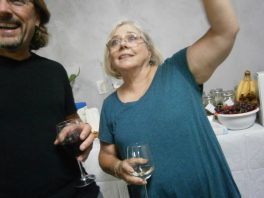
Ruth Barrett: Wendy was an advocate to non-academics who were practicing goddess spirituality to write about our movement, and our spiritual work with women. I was reluctant to write for academic projects Wendy suggested because it was such a different way of writing and felt so stiff and uncreative. She insisted and encouraged me so that my own words about the Dianic tradition could then be quoted by others writing for academic projects and settings. I am so deeply thankful to Wendy for her understanding the importance of practitioners contributing to these book projects and journals so that the lived experiences could be documented for posterity.
I treasured Wendy as a friend, and remember fondly when we shared a hotel room for the 2015 Parliament of Worlds Religions in Salt Lake City, Utah. Wendy, Barbara McGraw, and I shared some wonderful hours in the hotel bar sharing stories and discussing relevant feminist topics. I loved Wendy for her environmental commitments to our Mother Earth, the Goddess, and for her vision to make sure that women’s spirituality and paganism were documented. Wendy also encouraged me to teach for Cherry Hill Seminary which I was happy to do for a short time.
Every person is unique, and those who pass on leave the living to mourn their loss. Wendy had so much more to share, and for this I am especially heartbroken. Her contributions to the Goddess Movement, to Pagan Studies will live on beyond us all.
I bless Wendy’s brilliant wild spirit and for the honor of knowing her. I send condolences to her beloved husband Doug, and to all who will miss her so much. Rest well in Her arms, friend.
Kerry Noonan: I am so sad. Wendy was not only a wonderful scholar of the Goddess movement, she paved the way for scholar/practitioners who came up after her, was generous with her support to me and other younger scholars, gave so much to our community, and to the scholarly study of Neopaganism and the Goddess movement in her work in scholarly institutions like the American Academy of Religion, and the Cherry Hill Seminary, and through her published works. She was fun to be with, had a wonderful laugh, a shining smile. She did and accomplished so much in her life. We have lost a light. Blessed be Wendy — May the Goddess enfold her, and may her work live on….
Barbara McGraw: The loss of Wendy is very personal to me, as it is for many others at Cherry Hill. We were great friends and the loss is immeasurable. Wendy and I traveled up the coast together, and I stayed with her many times in her beautiful home in Long Beach, sharing wine and stories, some personal and some about the pagan community. She and her husband visited us in the Bay Area too, and we did ritual together. And our many years of fun at the American Academy of Religion stay in my heart.
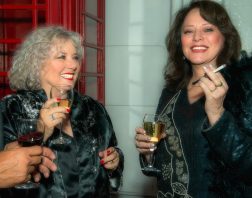
(period costume murder mystery party for Wendy’s 75th birthday; note that the cigarette is a prop)
I can’t imagine the world without her. As Michael York has said, she was an incredible force and a major figure in the Pagan community for many years. She began with Moon Birch Grove, when I am not sure, but it was at least late 80s. One of the most amazing Pagan events Wendy organized was in Long Beach in the 1990s in an amphitheater there. It was a glorious event that included beautiful invocations of the directions, with real waterfalls and song calling the West, and much music throughout the ritual, followed by all sorts of bands, dancing, vendors and more. (The rightwing Christian community there protested the event with signs and chanting outside the park grounds, which was a plus for Wendy because she was all about going against the tide to make a mark and the world a better place, which she did so many times in her life.)
Before becoming an academic, Wendy was a folk singer. She had married a Spaniard and lived in Europe for many years. When that marriage ended, she moved back to the United States and was a cocktail waitress for a time. Sadly, her daughter died at 12 years old, a devastating loss. But then she found her way to all of us – and eventually to her beloved husband, Doug Cox, who was and is a true gentlemen. They both married up, and I was honored to officiate at their beautiful wedding with my husband, Patrick McCollum. Talk about a happy day! Wendy sang for Doug at the reception, and I don’t think there was a dry eye.
Wendy was a dedicated frame drummer and started Lipishau with group of frame-drumming women who played at pagan gatherings all over Southern California — and other places. That was a sacred feminist practice for Wendy. And Wendy was in a coven for several decades, still ongoing, called Dragonweyr.
Wendy was instrumental to Cherry Hill Seminary, including as a benefactor. With Michael York, she started the Contemporary Pagan Studies unit at the American Academy of Religion as the first co-chairs, which continues to provide an ongoing, secure place in the academy for Pagan studies. And on top of all of that, she was a brilliant sociology scholar, having published numerous scholarly works, including the anthology she was so proud of, Daughters of the Goddess: Studies of Identity, Healing, and Empowerment, and having given numerous academic presentations over many years at the annual conferences of several scholarly societies. One of the best presentations I ever saw at the AAR was when Wendy left her notes in her car and spoke extemporaneously, not missing a beat. She was a real pro.
But she was also a novelist. She wrote steamy novels before she became an academic, but when she returned to that writing in her last years, it was historical novels. That was to be her retirement occupation. She was so excited when she published her last novel in 2018: The Fifth Sun, about the conquest of the Aztecs, under the name Wendy Lozano. It was a truly great read, and I recommend it highly. It should be a movie! Wendy actually had her stroke while giving an author presentation about the book while giving a public reading; she was rushed to the hospital, but the damage was serious. She never fully recovered her speech although her loving husband said he always could understand her. Her beloved hobby was knitting — she was an amazing knitting artist. I will cherish the beautiful sparking shawl she made me until the day I die. Sadly, she lost that ability after the stroke, too.
I am glad, though, that she is suffering no longer, that her last days were not painful, and I am grateful that her wonderful husband, Doug, stood by her so well these last couple of years. Wendy was a brave heart throughout her life — and to the end. May she be surrounded with love from all of us and the Mother of All.
Phyllis Curott: Hello remarkable Cherry Hill community, Wendy was a gorgeous soul, a blessing and a joy. I’m grateful to have known her and grateful for all of her remarkable and important work.
Lauren Raine: Wendy Griffin was truly one of those who “spoke for Gaia”, as an activist, scholar, ecologist, mythologist, and theologian. She spoke eloquently, factually, and passionately. She was also a warm and encouraging woman who it was my privilege to meet at the Pagan Studies Conference in California, and in the course of a course I took with her through Cherry Hill Seminary. I am truly sorry that she has left us all too soon and untimely, bur she leaves behind a legacy that will continue to speak for Gaia.
Helen Berger: Like many who have written, Wendy was my friend and my colleague. I met Wendy at a Society for the Scientific Study of Religion (SSSR) meeting. I can no longer remember where it was held or how many years ago it was, but certainly more than 30 years ago. Wendy was doing research at that time with Tanice Foltz on Goddess Spirituality. We were all delighted to find one another. I studied mixed groups of women and men; Wendy and Tanice [were in] Dianic groups that were women only. But, at a time that there were very few of us studying contemporary Pagans we were joyous to meet, to share our thoughts, support one another, and pretty quickly to organize contemporary Pagan sessions at the SSSR.
Initially we were accommodated but really not taken as seriously as we should have been by the SSSR. Our sessions were always at the least convenient times and we were put in small rooms. One year we were in a room behind the kitchen that was freezing because the air-conditioning level was set for the kitchen. Having come from New England I had a winter coat in my room, which I ran to get. None of the other presenters had that advantage. After the session we were all complaining about the accommodation of our area of research. But, Wendy, stopped us and said we need to go now, find the business manager of the society and make it clear that in the future we will not tolerate this. She led us to him, smilingly laid down the law, and from then on we got better time slots and rooms. That to me is Wendy in a nutshell. She knew how to organize, how to get things done, and how to make change happen. She did this over and over in helping create a Women’s Studies Department at her University, the section on contemporary Paganism at the American Academy of Religion, the book series she did with Chas and in her work at Cherry Hill Seminary. She was a leader and a “doer” as well as an exquisite writer and intellect.
Wendy, Tanice and I came through the academic ranks, in different time zones, but together. We all went up for tenure and promotion the same year and we all got it. I still remember our meeting at the first academic meeting we attended after we all heard. We formed in a small group hug and danced in a circle. Wendy was always supportive, for example, encouraging me to put myself forward when I remained silent at a meeting when she knew my work spoke to what was being discussed. Wendy demanded respect but she supported others—she supported me. She didn’t see the world as a zero sum game.
After leaving Cherry Hill Seminary there was one more chapter in Wendy’s career. As Barbara McGraw mentioned, Wendy had returned to being a novelist. I remember speaking to her after she made this decision. She was delighted to return to an occupation she had put aside to become an academic. She had just published the first of what she hoped would be a three part series of novels. She told me how much fun she was having, being retired, married to Doug, writing novels and being a grandmother. Doug came with grown children into his marriage with Wendy and they were a gift, particularly the grandchildren. Wendy had thought she had lost all chance to grandmother after her daughter’s death but Doug through his son provided her with grandchildren whom she loved with all her heart. I wish she had had more time to enjoy all she had worked for and created. I wish we all had more time to spend with her.

